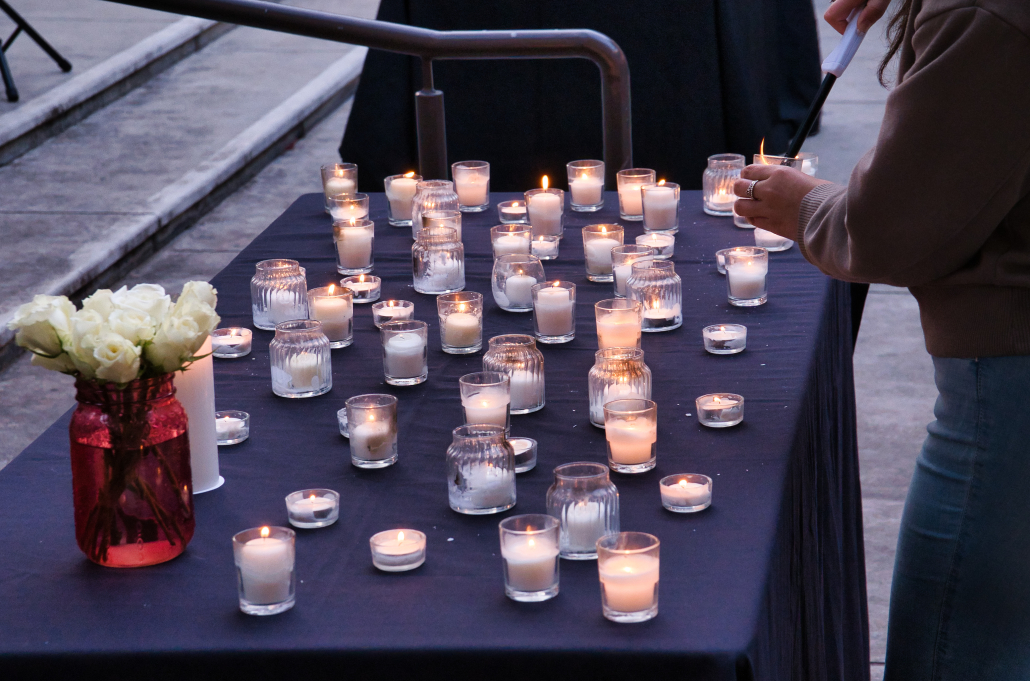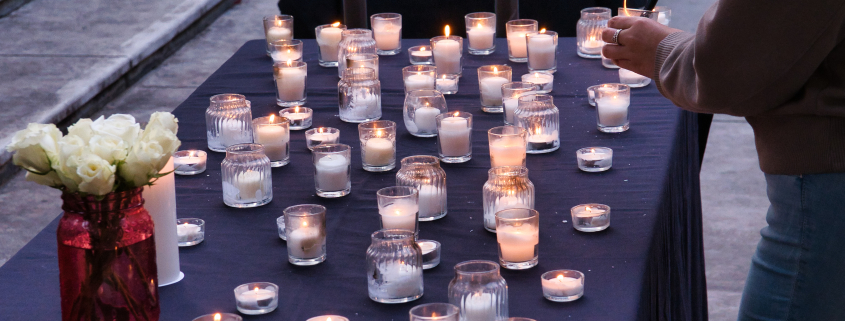Vigil mourns Turkey, Syria earthquake victims

Community members gathered at the University Religious Center courtyard Thursday evening for a vigil remembering those affected by the destructive and deadly earthquake that shook Turkey and Syria Monday. The area was lit up with candles as attendees mourned together at the event hosted by USC Student Affairs.
Dean of Religious Life Varun Soni led the event, at which students, faculty and staff shared their personal experiences and offered words of encouragement.
“We come together with our confusion and our despair to make sense of the senseless and to find hope in the hopeless,” Soni said in his opening speech. “More than anything else, we come together to be together at a time when we need it most. And, so, this evening, we will offer prayers, we will light candles, we will share stories, we will take action and we will stay close to each other.”
In his speech, Jeffery Newell, a therapy trainee at the Student Counseling Center, said there was no “correct way” to deal with emotions.
“You’re going to have a lot of strong feelings,” Newell said. “They’re going to come and go. Sometimes, they’ll come and stay … That’s all normal within the grieving process. Things like anger, frustration and extreme sadness can all be a part of it, so just kind of try to allow yourself to know that it’s okay. It’s normal.”
Yasir Tutunculer, a fifth-year student majoring in biochemistry who grew up in Istanbul, shared his personal experience with the disaster. When he found out about the earthquake, Tutunculer called his loved ones living in the affected areas who survived the disaster but did not feel safe remaining in the town.
“Turkey is not a country that hasn’t seen an earthquake before,” Tutunculer said, recalling the 7.6-magnitude earthquake in 1999 that killed 18,000 people. “We grew up with stories of that earthquake and how it felt like the end of the world … Even though I’m a medication technician who has a passion to serve his country, there was little I could do from California.”
Other speakers at the event were Anthony Bailey, vice provost of strategic and global initiatives; Richard Sunwoo, pastor at Our Savior Parish and USC Caruso Catholic Center; Dave Cohn, USC Hillel executive director; and Anthony Khoory, a senior majoring in sociology and co-director of the Middle Eastern North African Student Assembly.
Individuals from various religious backgrounds — Eastern Orthodox, Catholic, Protestant, Jewish and Muslim — stepped up to the podium during the vigil to offer prayers and blessings. Despite the differences in faith, students like Hilal Balik, a sophomore majoring in international relations and the global economy, felt moved by the power of togetherness within the common ground of being human.
“I think it was beautiful how they brought speakers from every background possible,” Balik said after the vigil. “There were … age differences, different communities, different religions, different backgrounds. I think that’s what made it more important because they were all talking about how, at the core, we’re all people, and that’s why we’re all supporting as people, not as Turks or people from Syria.”
Following the speeches, Soni invited audience members to share their feelings. Attendees lingered afterward to speak to one another about their struggles and shared pain. Among those who remained was Helin Yilmaz, a junior majoring in data science and health and human sciences whose family friends and relatives were impacted by the earthquake.
“I came here today because I have been feeling this immense amount of grief, and I know that it’s a collective grief,” Yilmaz said. “Here, I was hoping to find others that were sharing this pain because I think that in order to overcome something as severe and as catastrophic as this tragedy was, you have to have a community to support you, and I really did feel that here tonight.”
Various booths set up around the courtyard solicited support for attendees and fundraising for aid efforts in the affected regions. One of the booths offered a QR code to donate to Turkey and Syria, one was open for anyone to come and make appointments with the Counseling Center, and another sold coffee and Turkish delights to raise funds.
“It’s going to take a lot of time for us to be able to return back to whatever is considered normal,” Yilmaz said. “The effects of this tragedy are going to be felt for many years to come in the same way that my parents still feel the impact of the ‘99 earthquake … Right now … we just have to allow ourselves to feel by continuing to support and engage in these efforts to fundraise for donations.”

